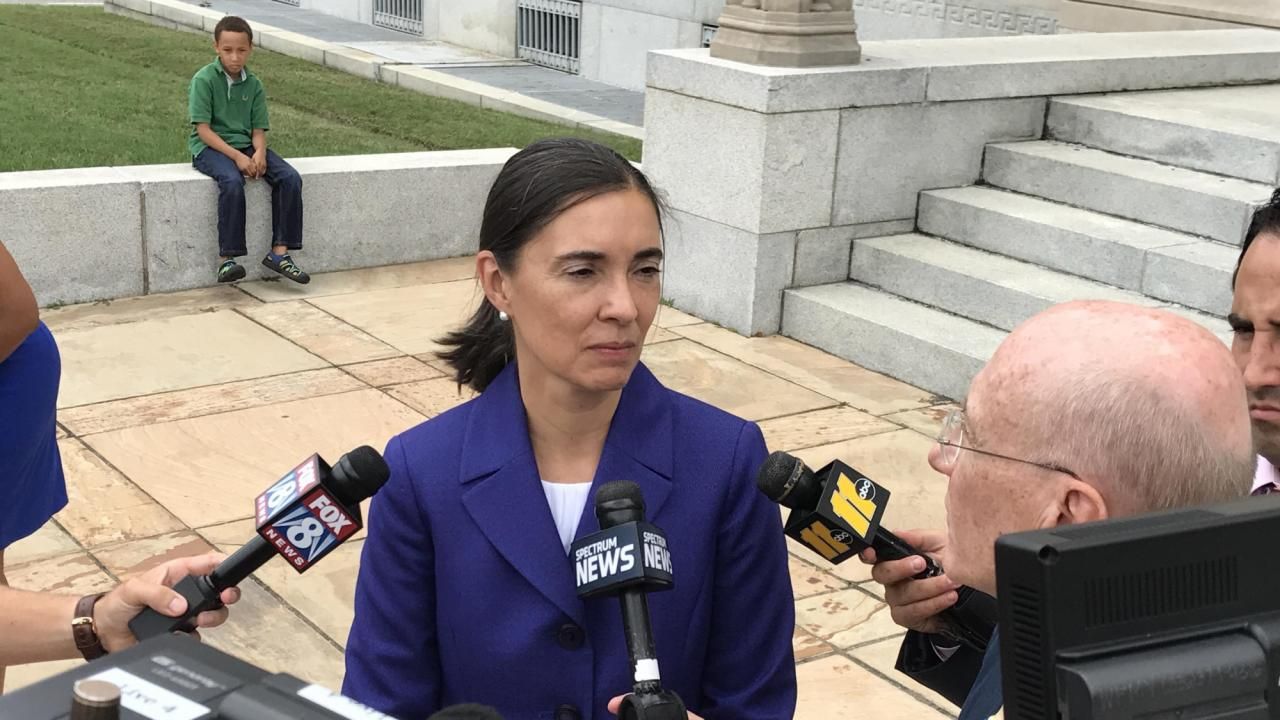Another loss for NC Supreme Court justice seeking to stop ethics probe

North Carolina Supreme Court Justice Anita Earls lost another attempt Thursday to stop a state ethics investigation that she contends is a politically motivated violation of her First Amendment rights.
Earls had asked for the investigation to be blocked until a trial can be held in her lawsuit against the state Judicial Standards Commission, which is investigating her. The investigation focuses on comments Earls made on racial and gender biases in the state courts system, as well as opinions from Republican justices that she contended were based more on politics than the law. Earls, a Democrat, is the only Black person on the Supreme Court, whose members are mostly white Republican men.
The federal judge overseeing the trial, William Osteen, denied Earls’ request to halt the investigation pending trial in a ruling last week. Earls appealed his decision, and then asked for the investigation to at least be blocked until that appeal can be heard. On Thursday Osteen denied that request as well.
Earls is unlikely to prove that the state investigation into her is unconstitutional, Osteen wrote Thursday. During a hearing earlier this month he acknowledged that judges don’t give up all their First Amendment rights when they take office. But they do agree to a code of ethics that puts some constraints on what they can say, he said.
"A justice’s speech carries certain weight due to the authority of, and respect commanded by, the office of North Carolina Supreme Court Justice," Osteen, who was appointed by former President George W. Bush, wrote last week. "Public criticism by a justice of other justices is different from the same statement by media outlets or citizens in general.”
Earls, a prominent civil rights attorney before winning election to the court in 2018, has been floated as a potential future United States Supreme Court justices by some national progressive groups.
North Carolina Republicans — who were frequently the target of her voting rights lawsuits before she became a judge — are not fans. State Supreme Court Chief Justice Paul Newby told the crowd at a private GOP fundraiser in 2019, WRAL reported, that Earls’ election to the court bothered him so much he lost sleep at night.
It’s not publicly known who requested the investigation into Earls. Some Democrats have blamed Newby, who has not responded to multiple requests for comment over the past several months since the once-confidential investigation became public knowledge.
The investigation is into whether Earls violated the judicial ethics code — and if so, how she should be punished. The options could range from a minor rebuke in private to a public censure to even being kicked off the Supreme Court and banned from ever serving as a North Carolina judge again.
But Earls contends that her comments were protected by the First Amendment and that the investigation violates her constitutional rights.
"The ruling, in our view, fails to recognize the significance of the constitutional violations to which Justice Earls has been subjected by the continuing investigations of the Judicial Standards Commission," Earls’ attorney Press Millen told WRAL after Osteen’s initial denial of her request to stop the investigation. "The opinion is contrary to established legal precedent on the role of federal courts in guaranteeing the freedom of speech."
The commission began investigating Earls earlier this year, following a WRAL report on secret policy changes being floated by the court’s new GOP leadership that critics characterized as power grabs.
That portion of the investigation appeared to have been based on a misreading of the report and was quickly dismissed, Earls said in her lawsuit, but then officials later reopened the investigation to examine separate comments she made on race and politics at the court.
In addition to her work on the Supreme Court, Earls also is a co-chairperson of the state task force on racial justice reforms Democratic Gov. Roy Cooper started in 2020.
Earls will still be able to make her argument that the investigation is unconstitutional at trial. She had wanted to block the investigation until then, however, since it's possible it could come to a conclusion before the trial begins.
During oral arguments in early November, Osteen repeatedly harped on Earls' comments about judges allowing their political views to inform their legal decisions. In his ruling Tuesday he said that's a valid line of investigation for the state to pursue.
Osteen also noted in his initial ruling that the investigation into Earls would have proceeded with total confidentiality had she not made it public herself with this lawsuit.
During oral arguments earlier this month, as well as at multiple press conferences at the state legislature, racial justice advocates and fellow Democratic politicians rallied around Earls.
She's being targeted by the Supreme Court's conservative leadership in an attempt to silence all Black attorneys and judges from speaking out against racial injustice, they said.
In a written statement earlier this year, the Judicial Standards Commission's executive director, Brittany Pinkham, defended its work as apolitical.
"The North Carolina Judicial Standards Commission is a nonpartisan investigative body comprised of members appointed by the chief justice, governor, General Assembly, and State Bar Council," she told WRAL. "The Commission is statutorily obligated to investigate all instances of alleged judicial misconduct and cannot comment on pending investigations."














